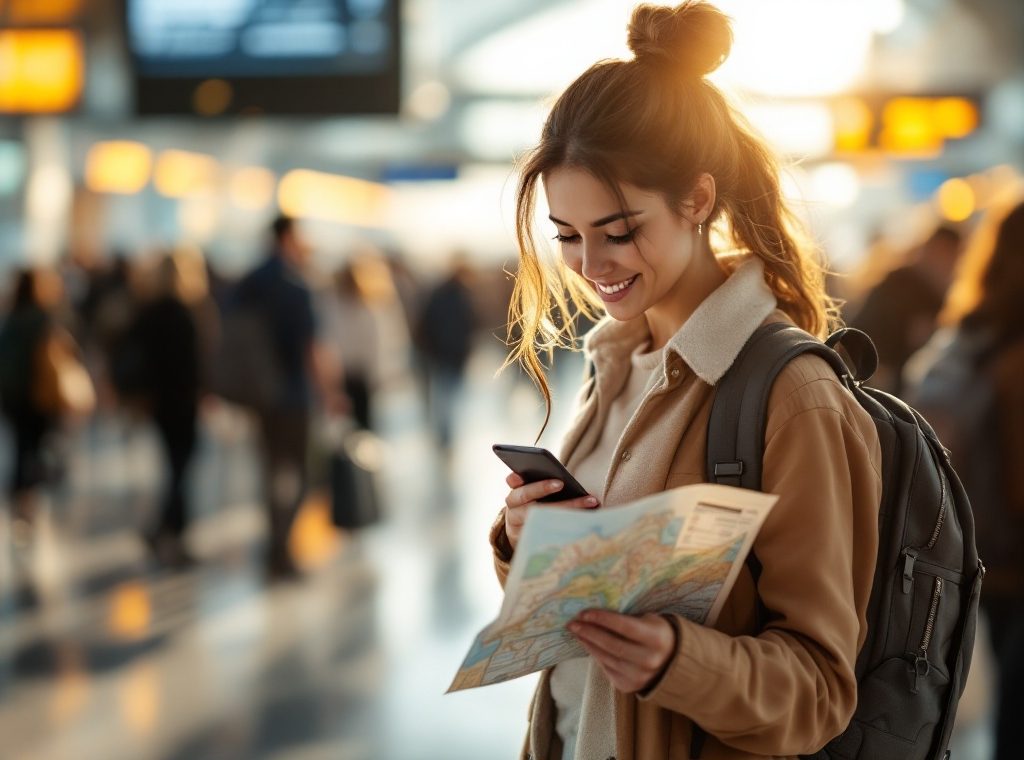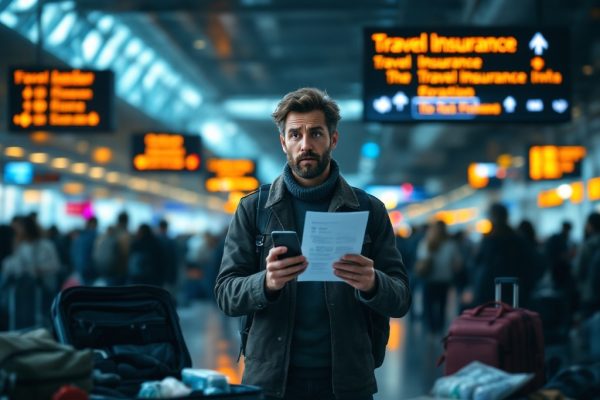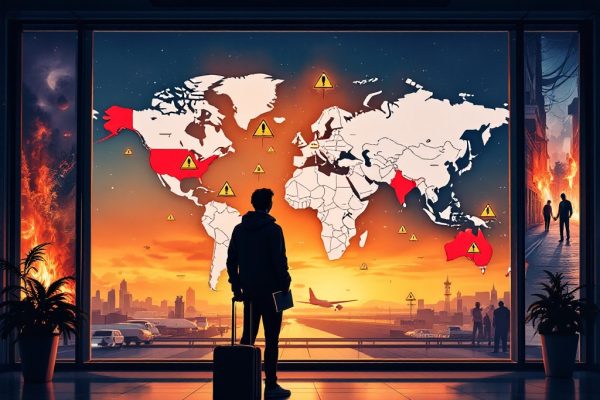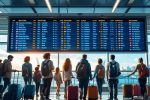How to Stay Safe While Traveling Alone
Dreaming of solo travel but worried about safety? Unlock the secrets to a secure and enriching adventure! This guide provides practical tips, from pre-trip planning, like creating emergency contacts and sharing itineraries, to on-the-ground strategies such as using anti-theft gear and staying aware of your surroundings. Empower yourself with the knowledge to navigate any challenge and embrace the freedom of solo travel with confidence. Start planning your safe solo journey today!
Important information
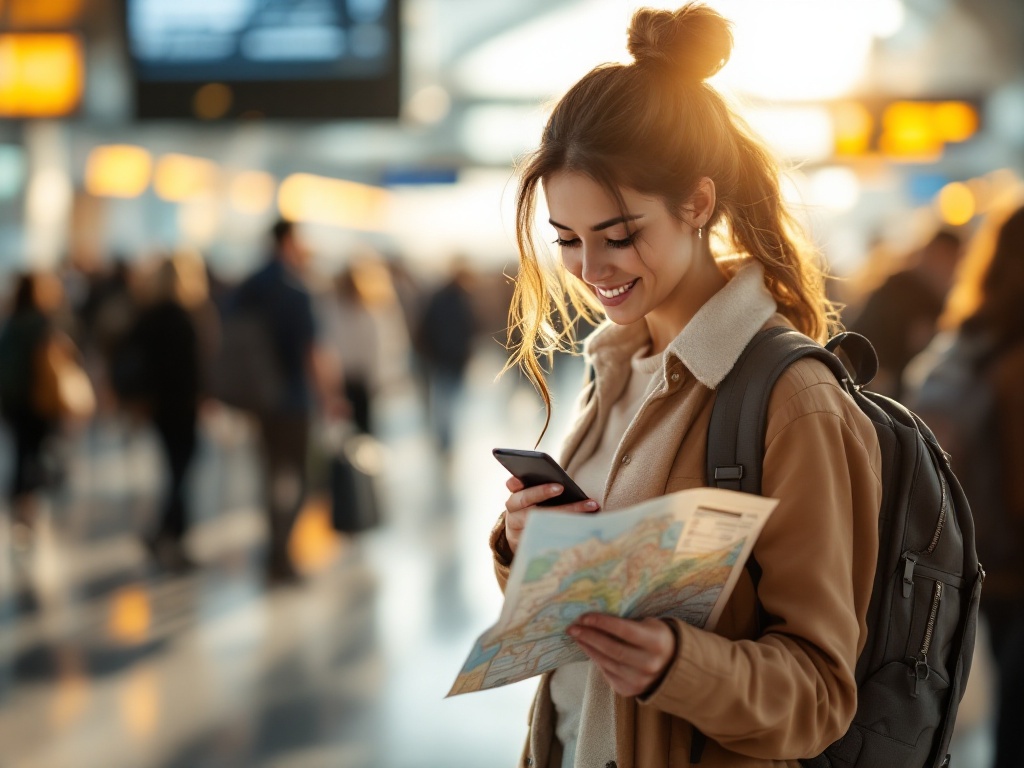
- Research your destination thoroughly: Learn about local laws, customs, and safety concerns. Identify safe neighborhoods and transportation options.
- Share your itinerary: Provide a detailed plan of your trip to family or friends, including accommodation, activities, and contact information. Check in with them regularly.
- Prioritize safe accommodations: Choose reputable hotels or hostels with good security features like 24/7 reception and secure room access. Inspect your room upon arrival.
- Be aware of your surroundings: Avoid walking alone at night in unfamiliar or poorly lit areas. Stay alert on public transport and keep your valuables secure.
- Have an emergency plan: Create a contact list with local emergency numbers, your embassy’s contact information, and family/friends. Know how to respond to potential issues like lost documents or medical emergencies.
Introduction to Safe Solo Travel
Embarking on a solo adventure offers unparalleled freedom and unforgettable experiences. However, prioritizing your safety is paramount. Traveling alone can sometimes increase vulnerability, especially in unfamiliar surroundings, as you lack the immediate support of a companion. Understanding potential risks is crucial, and taking precautions enhances both your safety and enjoyment. Thorough destination research and emergency plans are essential. Sharing your itinerary with loved ones provides an added layer of security, and staying connected with them regularly offers further peace of mind. Here’s how to maximize your safety while traveling solo:
Research your destination thoroughly. Understand local laws, customs, and potential safety concerns. Identify safe neighborhoods, transportation options, and emergency contact information.
Create a detailed itinerary. Share it with family or friends, including your accommodation details, planned activities, and contact information. Regularly check in with them to provide updates on your whereabouts.
Stay connected. Ensure your phone is charged and consider a portable charger. Purchase a local SIM card or use international roaming to stay in touch with loved ones and access important information.
Be aware of your surroundings. Avoid walking alone at night, especially in dimly lit areas. Stay alert on public transport and keep your valuables secure. Trust your instincts and if a situation feels unsafe, remove yourself.
Learn basic self-defense techniques. A self-defense class can boost your confidence and provide valuable skills to protect yourself in a threatening situation.
Why Safety is a Priority for Solo Travelers
Traveling solo offers incredible freedom, but safety should always be your top priority. Unfamiliar environments can present unexpected challenges, so stay aware of your surroundings. Careful planning is key to minimizing risks.
Research your destination thoroughly. Identify safe neighborhoods, learn about local customs, and understand potential hazards. This knowledge will be invaluable for a safe and enjoyable trip.
Choose safe accommodations and reliable transportation. Opt for reputable hotels or guesthouses in secure areas, and utilize trusted transportation services.
Share your itinerary with someone you trust. Provide a detailed plan of your trip, including accommodation details, transportation plans, and planned activities, to a friend or family member back home.
Stay alert and trust your instincts. Be mindful of your surroundings, especially in crowded areas or at night. If a situation feels unsafe, remove yourself from it immediately.
Avoid risky situations. Don’t display expensive jewelry or technology, be cautious about accepting drinks from strangers, and avoid walking alone in poorly lit or isolated areas.
By taking these precautions, you can ensure a positive and memorable solo adventure.
Preparation Before You Travel
Research your destination, including safety concerns and local customs.
Learn about available emergency services and book accommodations in safe, reputable establishments.
Pre-book transportation, especially for late arrivals.
Share your itinerary with a trusted friend or family member and establish regular check-in times.
Create an emergency plan with contact information for local authorities and your embassy or consulate.
Research Your Destination for Safety
Planning a safe and enjoyable solo trip involves several key steps. Research your destination thoroughly, learning about local customs, safety concerns, and any potentially risky areas. Choose accommodations with good security measures, and check reviews from other solo travelers. Select a destination that aligns with your interests and comfort level for a more positive experience.
Plan Your Accommodation Wisely
Prioritize reputable hotels or hostels with robust security measures like 24/7 reception and secure room access when selecting accommodations. Verify these details and focus on safety-related reviews online before booking. Upon arrival, inspect your room thoroughly, ensuring door and window locks function properly. Opt for well-lit areas and avoid ground-floor rooms if possible. Consider accommodations designed for solo travelers, which often provide enhanced security features such as women-only floors or organized group activities. Regardless of where you stay, always remain vigilant about your surroundings.
Prioritize reputable hotels or hostels with robust security measures like 24/7 reception and secure room access.
Verify these details and focus on safety-related reviews online before booking.
Upon arrival, inspect your room thoroughly, ensuring door and window locks function properly.
Opt for well-lit areas and avoid ground-floor rooms if possible.
Consider accommodations designed for solo travelers, which often provide enhanced security features.
Transportation Planning for Solo Travelers
Choose safe transportation. Opt for reputable taxis, ride-sharing services, or pre-book an airport transfer.
Prepare for navigation challenges. Download offline maps to ensure you can find your way, even without internet access.
Learn basic local phrases. Knowing how to ask for directions or assistance can be incredibly helpful in unfamiliar situations.
Sharing Travel Plans with Family or Friends
Before starting your journey, share your travel plans with a family member or friend. Include important details like flight information, accommodation details, and planned activities. Regular check-ins during your trip will increase your safety and provide peace of mind. Consistent communication throughout your travels is crucial.
Developing an Emergency Plan
Create a personalized emergency contact list. Include local emergency numbers, your country’s embassy or consulate, and close friends and family.
Establish a regular check-in system with someone back home. Agree on a schedule and communication method for added safety.
Consider potential issues and plan specific responses. Think about scenarios like a lost passport, medical emergency, or natural disaster, and know where to go and who to contact in these situations.
Research your destination and identify safe locations. Locate police stations, hospitals, and your embassy for quick access in case of emergencies.
Essential Travel Gear for Safety
Protect your belongings with a slash-proof anti-theft daypack. These bags deter thieves and often include RFID-blocking wallets to prevent electronic credit card theft. A money belt or hidden pouch offers added security for cash and copies of important documents.
Secure Your Accommodations
Enhance safety in your accommodations with a portable door lock and a personal safety alarm to deter unwanted entry.
Protect Your Online Activity
Use a VPN to encrypt your internet traffic and safeguard sensitive data, especially on public Wi-Fi.
Using an Anti-Theft Day Pack and RFID-Blocking Wallet
Secure your valuables with an anti-theft daypack. These bags feature lockable zippers and slash-proof material, along with hidden compartments to keep your belongings safe from thieves. For enhanced security, use an RFID-blocking wallet to shield your credit cards and passport from electronic theft. Together, these items offer superior protection for your peace of mind.
Keeping Emergency Cash and Documents Secure
Stash some cash in a money belt or neck pouch for safety.
Keep a reserve of your cash in your hotel safe.
Carry a small amount of cash for everyday spending.
Make copies of your important documents and keep them in a separate bag.
Secure the original documents in your money belt or hotel safe.
Create a digital backup of your documents and store it online for extra protection.
Technology for Travel Safety: Using Safety Apps and VPNs
Safety apps are valuable tools that offer real-time alerts, location sharing, and access to emergency contacts, significantly enhancing personal safety. VPNs, or Virtual Private Networks, encrypt your internet connection, protecting your online privacy, especially crucial on public Wi-Fi. Moreover, a VPN can bypass regional restrictions, allowing access to websites or services otherwise unavailable in your location, adding an extra layer of security to your online activities.
Safety Apps
- Provide real-time alerts.
- Enable location sharing with chosen contacts.
- Offer quick access to emergency contacts.
VPNs (Virtual Private Networks)
- Encrypt your internet connection for enhanced privacy.
- Protect your data, especially on public Wi-Fi.
- Bypass regional restrictions to access geo-blocked content.
- Add an extra layer of security to online activities.
Safety Strategies for When You’re Traveling
Safe Transportation. Research reputable taxi companies or ride-sharing services with excellent safety records. Public transport offers a budget-friendly and typically safe choice, but stay aware of your belongings, especially during rush hour. When renting a car, get acquainted with local traffic laws and road conditions. Choose well-lit routes, particularly at night.
Secure Accommodation. Select accommodations in safe, well-lit areas with positive security reviews. Upon arrival, inspect your room, ensuring locks, peepholes, and smoke detectors work. Ask about safety procedures and emergency exits. Store valuables in the hotel safe or use portable travel locks.
Stay Aware. Avoid walking alone at night in unfamiliar places. Stick to well-lit and populated streets. Be cautious when talking to strangers, and share your itinerary with a trusted contact, checking in regularly. Use maps and GPS discreetly, and learn basic local phrases for help.
Socializing Safely. Meeting new people can enhance your trip. Socialize in public areas and tell someone your plans. Avoid sharing too much personal information, and trust your gut. If a situation feels unsafe, leave. Consider group activities and tours to meet other travelers safely.
Choosing Safe Transportation Options
Prioritize safe transportation by opting for reputable taxi services or ride-sharing apps.
Consider public transport, especially in well-lit and populated areas.
Avoid walking alone after dark, particularly in unfamiliar or secluded locations.
Plan your trip in advance by researching routes and local transport options.
Ensuring Hotel and Accommodation Safety
Prioritize safety by selecting reputable accommodations with strong security reviews. Look for hotels or hostels with 24/7 reception and secure room access, ideally with in-room safes. Upon arrival, inspect your room and ensure all windows and doors lock securely. Whenever possible, opt for well-lit areas and avoid ground-floor rooms. Consider accommodations known for catering to solo travelers, as these often prioritize security. Familiarize yourself with the hotel layout and locate emergency exits for added peace of mind.
Choose accommodations with robust security measures. Look for features like 24/7 reception, secure room access, and in-room safes.
Upon arrival, inspect your room thoroughly. Ensure all windows and doors lock securely.
Opt for well-lit areas and avoid ground-floor rooms whenever possible. This can deter potential threats.
Consider accommodations known for catering to solo travelers. These establishments often prioritize guest safety.
Familiarize yourself with the hotel layout. Locate emergency exits for added peace of mind.
Staying Safe While Exploring Your Destination
Be aware of your surroundings, especially in isolated areas where it’s safer to travel with companions.
Trust your instincts—they are usually a good guide.
Keep your valuables close and secure.
When traveling, choose reliable transportation.
Research your destination in advance and familiarize yourself with local customs.
Share your itinerary with a trusted friend or family member.
Keep emergency contacts readily available.
Socializing Safely with Locals and Other Travelers
Embrace local customs and traditions.
Meet new acquaintances in public venues.
Share your itinerary with a trusted contact.
Traveler connection apps can be helpful, but prioritize reputable ones.
If you sense danger, remove yourself from the situation immediately—your well-being is key.
Moderate your alcohol intake to reduce risks such as drink tampering.
Practical Tips for Avoiding Dangerous Situations
Enhance your personal safety
- Choose well-lit and populated areas, especially at night.
- Use reputable transportation services.
- Avoid deserted locations, particularly after dark.
- Share your itinerary with a trusted contact.
- Stay alert and minimize distractions like headphones.
- If a situation feels unsafe, remove yourself immediately.
- Don’t hesitate to contact local authorities or hotel staff if needed.
Protect your valuables
- Store valuables in hotel safes or secure lockers.
- Keep important documents well-protected, consider a money belt or hidden pouch.
- Secure your luggage and daypack with locks.
- In crowded areas, be extra cautious of your belongings.
Stay vigilant against scams
- Research common scams at your destination.
- Be cautious with overly friendly strangers and unsolicited offers.
- Verify information from multiple sources.
- If a deal seems too good to be true, it probably is.
- Make informed decisions and resist pressure tactics.
Using Common Sense and Staying Alert
Stay safe on your travels by using your best judgment. Be aware of your surroundings and minimize distractions, especially when exploring unfamiliar locations. Avoid walking alone at night in dark or secluded areas. If a situation feels unsafe, remove yourself from it.
Trusting Your Instincts to Increase Safety
If a situation feels unsafe, trust your instincts and remove yourself. Seek out a well-lit, populated area. If necessary, contact the local police. A pre-arranged emergency plan is always a good idea, including knowing the location of your embassy or consulate. Keeping family and friends informed of your whereabouts allows them to provide support. Hotel staff or trustworthy local residents can also be valuable resources; don’t hesitate to reach out for assistance.
If a situation feels unsafe, trust your instincts and remove yourself.
Seek out a well-lit, populated area.
If necessary, contact the local police.
A pre-arranged emergency plan is always a good idea, including knowing the location of your embassy or consulate.
Keeping family and friends informed of your whereabouts allows them to provide support.
Hotel staff or trustworthy local residents can also be valuable resources; don’t hesitate to reach out for assistance.
Preventing Theft: Securing Valuables and Using Locks
Lock your luggage and keep valuables close, such as passports and cash in a money belt or neck pouch.
Utilize hotel safes whenever possible for important documents and valuables.
Avoid displaying expensive jewelry or electronics to minimize the risk of theft.
Consider using anti-theft bags for added peace of mind and security.
Dealing with Travel Scams and Making Informed Decisions
Research common scams at your destination before you go.
If a deal sounds too good to be true, it probably is.
Use reputable transportation services.
Safeguard your personal information.
Be wary of sharing your itinerary with strangers.
Specific Tips for Female Solo Travelers
Stay alert and project confidence to enhance your safety. Avoid walking alone at night, especially in unfamiliar or poorly lit areas. If you feel uneasy, remove yourself from the situation immediately. Dress respectfully and observe local customs to blend in and avoid attracting unwanted attention. Share your itinerary with a trusted friend or family member and check in regularly. A safety app can provide an extra layer of security, allowing you to share your location and quickly contact emergency services if needed. Learning basic self-defense can increase your confidence and preparedness. Consider carrying a personal safety alarm or a whistle for added security. Familiarize yourself with local emergency numbers and the location of your country’s embassy or consulate.
Stay alert and project confidence.
Avoid walking alone at night, especially in unfamiliar or poorly lit areas. If you feel uneasy, remove yourself from the situation immediately.
Dress respectfully and observe local customs to blend in and avoid attracting unwanted attention.
Share your itinerary with a trusted friend or family member and check in regularly.
Use a safety app. It can provide an extra layer of security, allowing you to share your location and quickly contact emergency services if needed.
Learn basic self-defense. This can increase your confidence and preparedness.
Consider carrying a personal safety alarm or a whistle for added security.
Familiarize yourself with local emergency numbers and the location of your country’s embassy or consulate.
Avoiding Unwanted Attention and Risks
Wearing a wedding ring can deter unwanted attention by signaling your unavailability.
Researching appropriate attire beforehand is a wise precaution.
Respecting local customs, such as dressing modestly, demonstrates cultural sensitivity and minimizes potential risks.
Understanding local traditions can enhance your personal safety.

